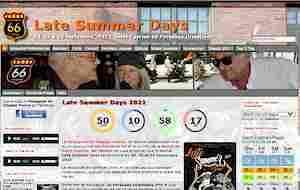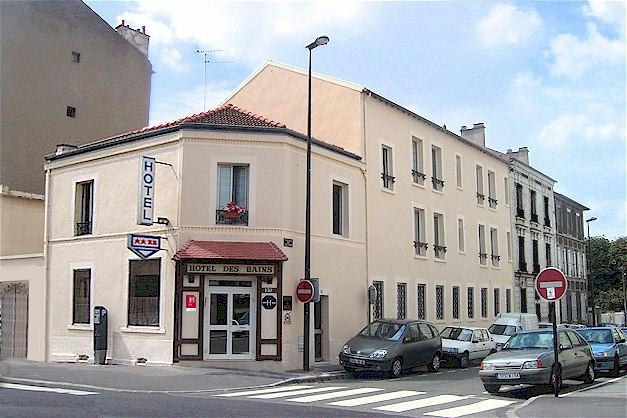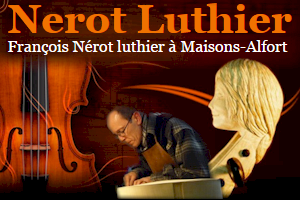Étiquette : CNRS
Act while solutions exist, the IPCC urges
Climate change has done more damage than expected, but options still exist for moving forward, explains the CNRS biologist Camille Parmesan, who helped draft the “Impacts, Adaptation and Vulnerability” report of the Intergovernmental Panel on Climate C…
Act while solutions exist, the IPCC urges
Climate change has done more damage than expected, but options still exist for moving forward, explains the CNRS biologist Camille Parmesan, who helped draft the “Impacts, Adaptation and Vulnerability” report of the Intergovernmental Panel on Climate C…
Cécile Charrier, a head full of synapses
The biologist Cécile Charrier, winner of the Irène Joliot-Curie “Young Female Scientist” award in 2021, has been trying for several years to unlock the secrets of the neural circuits in our brains.
Choosing a vaccination strategy to deal with Covid variants
How can the appearance of a new variant that will affect the efficacy of vaccination against Covid be prevented? New models provide a clearer understanding of this phenomenon, in order to anticipate it and adapt our vaccine strategies.
The thousand and one facets of glass
The United Nations declared 2022 the International Year of Glass, whose official launch took place on 10 and 11 February in Geneva, Switzerland. Researcher Daniel Neuville provides a brief yet eye-opening overview of the huge range of science-related i…
A century after BCG, a global forum tackles tuberculosis
A century after the first inoculation with BCG, tuberculosis continues to exert its devastating effects; the vaccine offers poor protection for adults and the bacilli are displaying increasing resistance to antibiotic therapy. From 22 to 25 February 20…
The Antarctic: an icy laboratory
Because of its geographical location, pristine expanses and animal populations, the Antarctic has been a prized location for scientific research over the past few decades. Severely impacted by global warming, it is now also a vital environment for stud…
A tremendously costly error
Computer scientist and mathematician Jean-Paul Delahaye explains why Bitcoin’s electricity consumption is a major flaw that should result in it being banned or replaced by less energy-intensive cryptocurrencies.
Order within disorder
What if there was order within the disorder that surrounds us? Researchers are examining phenomena across all scales in order to explain the dynamics of apparently chaotic or disordered systems, such as clouds, stock prices, and deep neural networks.
Forgotten dates in Europe’s history (1/4)
In the first episode of our series on European history, we take a look at the movements advocating the abolition of the death penalty, the execution of Europe’s last witch, and the struggle for an eight-hour working day.
The metaverse at the crossroads of illusions
An inevitable evolution… or just a fad? The computer scientist Michel Beaudouin-Lafon provides an uncompromising analysis of the metaverse, the virtual world that some digital companies are pinning high hopes on.
Does the Enlightenment still shine in the 21st century?
The Age of Enlightenment is in the spotlight at the French pavilion at Expo 2020 in Dubai. The 18th-century movement generated a surge of technical and scientific progress in Europe, but did it also pave the way for the unbridled exploitation of scienc…
Autonomous cars hit French roads
For a few days last year, scientists tried a self-driving car on the roads of Rambouillet (Paris region). The goal was to analyse its behaviour in relation to other road users, and to test its entry into roundabouts. Results from a life-size experiment.
Putting nature at the heart of society to fight climate change
More than a million animal and plant species are today threatened with extinction worldwide. To make things worse, this biodiversity loss is now being irremediably accelerated by climate change. The researcher Ignacio Palomo points out that nature can …
Europe set to fight cancer
The European Union aims to reduce by 3 million the number of deaths from cancer on the continent between now and 2030. As France took over the EU presidency on 1 January 2022, we review the situation with Yvan De Launoit, deputy scientific director in …
Europe set to fight cancer
The European Union aims to reduce by 3 million the number of deaths from cancer on the continent between now and 2030. As France took over the EU presidency on 1 January 2022, we review the situation with Yvan De Launoit, deputy scientific director in …
The unforeseen acceptance of deepfakes
Rapid improvements in deepfake technology, which modifies a person’s appearance or voice in real time, call for an ethical review at this still early stage. Researchers in cognitive science shed some light on the public’s perception of this phenomenon….
Art and archaeology are the new frontiers for AI
Algorithms are increasingly reliable for identifying the content of images, but so far have not been able to evaluate their aesthetic or emotional value. A new horizon that artificial intelligence is now beginning to explore.
Artificial genomes offer a promising lead
This is research that has not gone unnoticed: scientists have created extremely realistic artificial genomes as a result of their work on artificial neural networks. Flora Jay, who coordinated these efforts, explains.
Covid-19: What have we learned from the pandemic?
From the Neolithic period to modern times, from cattle plague to SARS-CoV-2, the emergence of new infectious diseases has often been the result of changes that mankind has inflicted on the environment. This documentary shows how biologists, anthropolog…
Oxytocin, from love potion to medicine
Oxytocin appears to be involved in several types of attachment, including love. Marcel Hibert explains its chemical and biological mechanisms and the therapeutic hopes it inspires, notably in the treatment of autism.
Sea monsters at the time of the dinosaurs
Over 60 million years ago, superpredators such as ichthyosaurs, plesiosaurs and mosasaurs roamed the seas. But what exactly were these reptiles, which are often incorrectly referred to as “marine dinosaurs”? CNRS News asked three of the authors of “La …
Urban birds, stressed birds
Birds are an increasingly rare sight in our cities. In this report, researchers from the Centre for Biological Studies of Chizé (CEBC) investigate the problems – noise, light, lack of food – that affect various species of birds in urban areas, and seek…
Data storage: the DNA revolution
Two seminal revolutionary declarations, now stored and encapsulated in DNA, are joining the French national archives (Archives nationales). Behind this project is the DNA Drive technology developed by the researchers Stéphane Lemaire and Pierre Crozet.
SPIRAL2, the atom factory
In the French city of Caen, GANIL’s new heavy ion accelerator, SPIRAL2, has completed commissioning. The custom-built linear accelerator is even more powerful than its predecessor and will pave the way for the exploration, with unparalleled precision, …
Writers know no frontiers
With more than 500 documents from archives around the globe, a new collective volume translated into eight languages traces the history of PEN International, the largest worldwide writers’ organisation, which is celebrating its centennial this year.
Ransomware: research strikes back
All it takes is one click for your computer to be taken hostage by a malware program that will relinquish control only for a ransom. Upon the launch of Cybermallix, a CNRS joint laboratory with the software publisher Wallix, Jean-Yves Marion, director …
Sea urchins under threat
Over the past few years, populations of purple sea urchins off the coasts of France have been declining. In Corsica, researchers at the Stella Mare lab, headed by Antoine Aiello, winner of the CNRS 2021 innovation medal, are taking action by monitoring…
Natural radioactivity sustains unsuspected subsurface life
At the bottom of mines or beneath the ocean floor, drillings reveal the presence of vast communities of microorganisms in the subsurface of our planet. Scientists believe this could be due to natural radioactivity in rocks, which may offset the lack of…
Athénan, a multi-champion AI
Close-up on a French system that won the jackpot at the recent 24th Computer Olympiad, a global multi-game competition for artificial intelligence.
Do algorithms keep playing the same old song?
What is the impact of algorithmic recommendations on the diversity of the music being streamed? Using data made available by Deezer, the researchers of the Records project have formulated an initial detailed view of the question.
How imaging is revolutionising biology
For the launch of the Year of Biology, the neurobiologist Daniel Choquet explains how progress in imaging has contributed to the current explosion of knowledge in the life sciences.
A new window into the Bronze Age discovered in central France
A team of archaeologists from the TRACES laboratory, in southwestern France, carrying out excavations in the Allier department (central France) has made a discovery dating back to more than 2,800 years ago. They have uncovered several exceptional depos…
MAGIC explores the polar skies
Last August, the scientists taking part in the fourth MAGIC campaign headed for Scandinavia, north of the Arctic Circle. Their goal was to study the atmospheric distribution of greenhouse gases using ground-based instruments, balloons and research airc…
“Proust’s political and literary activities are indissociable”
Everyone is familiar with the author, but Marcel Proust also championed a number of political ideas, some of which are still in the public arena today. To mark the anniversaries of his winning the Goncourt Prize in French literature in 1919 and his dea…
How light governs sleep
At the Hospices Civils general hospital in Strasbourg (northeastern France), the researchers of the International Research Center for ChronoSomnology (CIRCSom) want to know how well we sleep and why. Their research focuses in particular on the role of …






